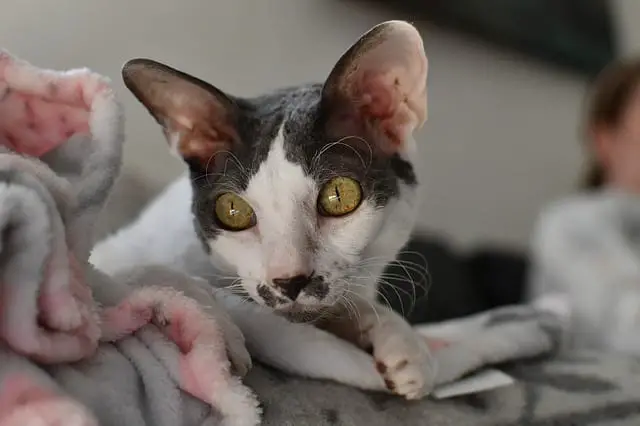
What is the ideal diet for the Cornish Rex? Let’s find out how to plan the best diet for this wonderful cat breed.
The Cornish Rex is a cat with a peculiar appearance and an irresistible character. Whether you have decided to adopt this cat, or already share your life with him, knowing which is the most suitable diet based on its characteristics is essential to ensure that the life of this furry cat is long and healthy: let’s explore everything about feeding the Cornish Rex.
Nutrition of the Cornish Rex: doses and frequency of meals
To fully explore the characteristics of the Cornish Rex’s ideal diet, this question must be answered: when and how much to feed the cat?
Regarding the quantities, the specimens of this breed are not particularly greedy.
Being very vital cats, however, these cats need a sufficient nutritional intake, which can provide them with all the energy to face the day with liveliness and enthusiasm.
Generally, the recommended dose of wet and dry food amounts to 40-50 grams for each kilo of weight.
However, it would be preferable to contact your vet to get a food plan that is tailored to a variety of individual parameters, such as the cat’s age, lifestyle, and health condition.
When to feed the Cornish Rex? It is recommended to do this twice a day, preferably in the morning and in the evening.
In this way, you will not risk that the hungry cat will wake up in the middle of the night because he is demanding his dose of food!
What to feed this breed

In order for the overview on the best nutrition of the Cornish Rex to be complete, we just have to find out which foods to feed this cat.
Just like all other felines, the specimens of this breed are carnivores. Therefore, it is essential that their diet is mainly based on the intake of proteins of animal origin.
The privileged source? Rabbit, turkey and chicken meat. Occasionally, the cat may also be given fish.
These are foods that contain essential nutrients for the well-being of the cat, including vitamins and other substances that the feline can take exclusively from its diet, as the body is unable to synthesize them by itself.
These include: niacin, vitamin B12, Omega-3 and Omega-6.
Finally, all that remains is to decide whether to give your Cornish Rex a home diet or industrial feed.
In the first case, it will be necessary to prepare the food for your four-legged friend by yourself, starting from the selection of fresh and top quality ingredients, up to the cooking of the dishes.
In this case, it is essential to contact the veterinarian, so that he can formulate a well-balanced food plan complete with all the nutrients that, if this type of diet were not properly planned, would risk running out, causing risky deficiencies for the cat.
Alternatively, deciding to opt for the administration of industrial feeds, it will be necessary to take a very careful look at the ingredients and the nutritional table shown on the back of the package.
In this way, you will be sure to choose the best, most genuine and healthy product for your pet.






